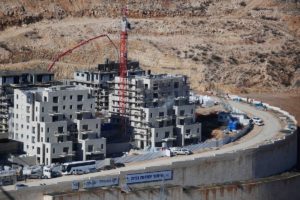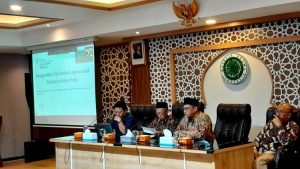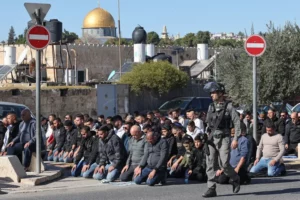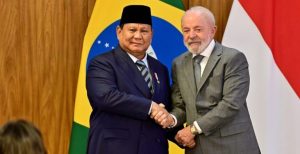 Cairo, 5 Muharram 1435/8 November 2013 (MINA) – Egypt’s Foreign Minister, Nabil Fahmy has said that parliamentary elections would be held between February and March next year, followed by presidential polls in early summer.
Cairo, 5 Muharram 1435/8 November 2013 (MINA) – Egypt’s Foreign Minister, Nabil Fahmy has said that parliamentary elections would be held between February and March next year, followed by presidential polls in early summer.
Fahmy, on a visit to Spain, said on Friday that the political arm of deposed President Mohamed Morsi’s banned Muslim Brotherhood could take part.
The Egyptian Foreign Minister’s comments provided the most specific timeline yet for the end of the interim army-backed government and a return to electoral politics in the Arab world’s most populous country.
The country has seen some of the worst violence in its modern history since Morsi’s removal in a July 3 military coup, Aljazeera reported as monitored by Mi’raj News Agency (MINA).
Also Read: US Revokes Terrorist Designation for Syrian Hayat Tahrir al-Sham
Fahmy told in an interview that the Freedom and Justice Party, the political arm of the Muslim Brotherhood, “is still legal in Egypt” and free to participate in the parliamentary elections.
The Brotherhood failed in an attempt on Wednesday to overturn a court ruling banning it, while Morsi himself is on trial with leading members of the Brotherhood on charges of inciting violence.
Speaking during a visit to Spain, Fahmy said the presidential elections would be announced “by the end of next spring” and that the elections would be held “a maximum of two months after the announcement”.
“So you’re looking at elections in the summer for president, that’s the last step,” he said.
Also Read: Israeli Airstrikes Hit Western Yemen Amid Rising Tensions
The elections will come after a referendum on a new constitution, which Fahmy said would be held in December. A 50-member committee is working on amending a constitution that was drafted under Morsi.
Since July, the army-backed government has carried out a security crackdown on the Muslim Brotherhood as well as members of the Anti-coup Alliance. Its leaders are behind bars along with more than 2,000 members and supporters. Hundreds of others have also been killed since the army takeover.
In late 2010, a parliamentary election was held, though it was followed by controversy and repression as well as accusations of fraud.[4]
Following similar events in Tunisia during the Arab Spring, Egyptian activists called for protesters to turn up in cities around Egypt on specific days. Though violence was reported at some points, protests were largely peaceful with the army staying quiet until 10 February 2011, when calls for Hosni Mubarak to resign were at their peak.
Also Read: Turkiye Denies $393.7 Million Export Claims to Israel, Calls Reports ‘Disinformation’
The following day, Vice President Omar Suleiman announced Mubarak’s resignation from the presidency while turning power over to the military. The Supreme Council of the Armed Forces, headed by Field Marshal Mohamed Hussein Tantawi, would lead the country for a transitional period until a civilian government took over.
A constitutional referendum was then approved on 19 March that would ease the process of electing a president.
A presidential election was held in Egypt in two rounds, the first on 23 and 24 May 2012 and the second on 16 and 17 June. The Muslim Brotherhooddeclared early 18 June 2012, that its candidate,Mohammed Morsi, won Egypt’s presidential election, which would be the first victory of an Islamist as head of state in the Arab world.
It was the second presidential election in Egypt’s history with more than one candidate, following the 2005 election, and the first presidential election after the 2011 Egyptian revolutionwhich ousted president Hosni Mubarak, during the Arab Spring. The term of the regime lasted little over a year as Morsi was ousted in a military coup in July 2013.
Also Read: Turkish and Iranian Presidents Meet in Azerbaijan
In the first round, with a voter turnout of 46%, the results were split between five major candidates: Mohamed Morsi (25%), Ahmed Shafik (24%), Hamdeen Sabahi(21%), Abdel Moneim Aboul Fotouh (18%), and Amr Moussa (11%), while the remaining 2% were split between several smaller candidates. The elections set the stage for the divisions that were to follow, along Islamist and secular lines, and those opposed to and those supporting the former political elite.
Islamist candidates Morsi and Fotouh won roughly 42% of the vote, while the remaining secular candidates won 56% of the vote. Candidates Shafik and Moussa held positions under the Mubarak regime and won 35% of the vote, while Sabahi was a prominent dissident during the Sadat and Mubarak regimes.
Following the second round, with a voter turnout of 52%, on 24 June 2012, Egypt‘s election commission announced that Muslim Brotherhood candidate Mohammed Morsi had won Egypt’s presidential elections. Morsi won by a narrow margin over Ahmed Shafik, the final prime minister under deposed President Hosni Mubarak.
The commission said Morsi took 51.7% of the vote versus 48.3% for Shafik. Morsi was sworn in on 30 June 2012 and was later ousted in a coup on 3 July 2013 following the political struggle that resulted from his constitutional referendum in December 2012. (T/P04/E1)
Also Read: Iran Reaffirms Commitment to Uranium Enrichment
Mi’raj News Agency (MINA)





























 Mina Indonesia
Mina Indonesia Mina Arabic
Mina Arabic